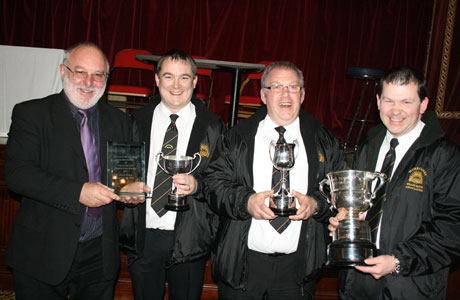
Second Section prize winning smile...
Picture: Steve Jack
There may well have been plenty of bar room debate, alcohol fuelled opinions and ill informed accusations flying around the Winter Gardens after the conclusion of the Second Section contest on Sunday.
However, when the dust finally settled, there was only one subjective result that mattered.
Strong opinion
That of course came from adjudicator Kevin Wadsworth, who once again delivered a strong, clearly defined analysis of why he picked the bands he did to send to Cheltenham in September.
As much as people may moan, grumble and even believe with the best of intentions that they were hard done by, the fact of the matter is that with one man in the box, and one man who has gained a well respected reputation for his clear cut decision making, all complaints are fairly meaningless.
Kevin told the audience why he believed the best bands delivered on Eric Ball’s ‘Resurgam’ and why their approach appealed in the box.
There were those that may have disagreed, but you couldn’t say he didn’t make it crystal clear.
Deep seated emotion
Eric Ball’s work is one of deep-seated emotion, not artificial sugar coated pathos.
On what was an interesting and always intriguing contest, a host of bands performed with not much of the former and plenty of the latter.
’Resurgam’ is simply not a work suited to this level of competition, even in such a strong region as the North West.
Perhaps bands and players have really forgotten how to play great music such as this though?
Shakespeare
Technically the majority played the notes – but that is like reading out the telephone directory thinking its Shakespeare.
A more personal understanding of the musical inspiration was needed – and at this level, that was nigh impossible, even with a field made up of well-matched, accurately graded, Second Section bands.
The best
The best in Kevin’s opinion (Morecambe and Haydock) did do that, whilst others, however technically secure, played with little emotional connection to the music.
At this level that is always going to be the case when a set work as inappropriate as this is chosen.
As hard as MDs tried, (and there were a host of experienced conductors who would have played this piece at a higher level) they just did not have the players under their command to allow for anything more than the basics of band playing.
Secure
As with all the bands that finished in the top six (and some outside), Morecambe produced a technically secure account that also benefited from noticeable subtle shadings and tasteful phrasing under Andrew Warriner’s sympathetic direction.
It did have its moments of uncertainty, but it was a performance shaped with understanding and little recourse to saccharin coated emotion.
So too Haydock under Mark Quinn, who produced balanced warmth to their ensemble sound from the outset to go with technically adept execution.
Like the winners there was a noticeable sense of purposeful phrasing that didn’t go unnoticed – especially in the box.
Contrast
The contrast between the two bands that many in the bars spoke about afterwards as their potential winners, Delph and Mossley, wasn’t that marked – although you suspected that many of those doing the talking hadn’t heard a great deal of the competition throughout the day (the hall wasn’t exactly full to bursting point).
Still, both produced technically solid accounts, impressively so in places, given the need for ensemble security in the opening and the final repose.
Why they didn’t come higher than 12th and 15th will remain a mystery to those who heard all the bands on the day (and more of a conspiracy theory for many who didn’t), but on this occasion their performances did not find a musical resonance in the box.
That’s contesting for you.
Commendable
There were a number of commendable performances filling the top six places.
Co-operative 2000 Brass delivered a thoughtful, if not error free account under Jamie Meredith, whilst Tyldesley encountered some grating tuning issues at inopportune moments in the score.
Touch rich
Uppermill’s colourful approach was a touch rich in the emotion stakes to come higher than fifth, whilst Flixtion delivered a performance that had all the right elements, but just lacked overall consistency.
Behind these it was a question of compare and contrast (although what that entailed with Delph and Mossley was open to question by many).
Food for thought
Plenty of food for thought then for the likes of Haslingden & Helmshore, Middleton, Eccleston and Besses, all of whom delivered hard working performances.
On another day anyone of them could have exchanged places – but then on another day they wouldn’t be playing a work that elicits such personal emotions.
‘Resurgam’ did none of them any great favours.
It was interesting though that the majority of the MDs with these bands opted to keep the pace of the music flowing, and whilst there were the usual blips and blobs, there were times when they could have benefited from an occasional sympathetic touch on the break pedal.
Sympathetic
Grenville Moore’s sympathetic interpretation of the score was undone by too many unforced errors in execution with Dobcross, whilst Blackpool, Douglas Town and Old Hall Brass will know that on this occasion they struggled to meet both the technical and musical demands placed on them by the piece.
Overall though, a day when a strong opinion was needed and a strong opinion was what was given.
It was one that didn’t find favour with everyone, but there was no doubting that it was well informed.
Dave Tinker

2011 North West Regional Championship — Second Section retrospective
Plenty of debate and opinion, but only one result mattered in the Second Section — and that was the one that sent Morecambe and Haydock to Cheltenham.












